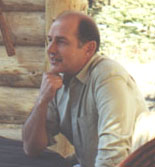
(Click on photo for larger image.)
Restaurateur, hotelier, all-around opportunistic businessman: Despite having lived in Lynx River
for many years, Gerry Kisilenko is still in many ways an outsider. Yet even the detached Gerry
occasionally has touching moments with other residents of the town, proving as always that no
character in "North of 60" is one dimensional.
Here's an interview I did with Lubomir Mykytiuk in October, 2000. (Please note that it includes
minor spoilers for the series finale, "Borrowed Time.")
PW: First off, let me please ask you for the correct pronunciation of your last name.
LM: I always tell people to think of Mickey Mouse wearing a toque. Say "Mickey toque" and you've got it.
[Note to non-Canadians: A toque--also spelled "tuque"--is a thick stocking cap used to keep your ears warm in those cold northern winters! It's pronounced "tuke."]

(Click on photo for larger image.) |
PW: When you were in a stage play called "Paper Wheat," one of the characters you played was a Ukrainian immigrant. And obviously Gerry Kisilenko is Ukrainian. Were your grandparents or parents Ukrainian?
LM: I was born in Ukraine. I came to Canada when I was about five, and I lived in Montreal. That's where I grew up. I went to Loyola College, a good Jesuit college in Montreal. In those days, you didn't have too many drama schools, just drama societies, so the students themselves put things on. It was all new to me. I just got kind of interested in it, and it was great.
PW: Had you gone there intending to major in theater?
LM: No, I actually was majoring in mathematics, believe it or not.
PW: Have you kept that up at all?
LM: I read the occasional book on physics for fun.
PW: Well, Tom Lehrer is an entertainer and also a math professor.
LM: I know! I know Tom Lehrer. [singing] "Be prepared, that's the Boy Scouts' marching song!"
PW: So obviously you've done a lot of theater work.
LM: I studied acting in the States, in New York. I went to NYU. I spent three years, I got my Masters of Fine Arts. And then I came back to Canada and started acting.
PW: And you enjoy film, TV, stage, all of the above?
LM: Yes, I actually like the fact that I've done all of them. I really find it interesting to go from, like this year I've done film, I've done television, I've done a radio drama.
PW: Radio drama?
LM: Oh yeah, I love radio drama. It's one of my favorite venues.
PW: So you like the change of pace?
LM: Yeah, I do. The basic principle is the same. Acting is acting.
PW: But in a case like this ("Dream Storm"), it's stop and go, stop and go. In a play, you get on stage and go for three hours.
LM: It's very different. A good friend of mine once said that stage is the actor's medium. Film and television are the director's medium, and the editor's, and the producer's. And the novel is the writer's medium.
PW: You came on board "North of 60" at the very start.
LM: Yeah, it's kind of an odd story. They actually had hired somebody else to play Gerry originally.
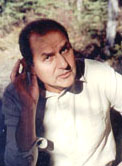
|
PW: And was he going to be Ukrainian?
LM: I think so, because I know that Wayne [Grigsby] wanted me right away. I'd met him at a party, and he said, "I have this interesting part for you." Because he'd actually sort of written it for me. He used to be a drama critic in Montreal years ago. I did a number of plays there, and he'd reviewed me a number of times and knew my work. And he also had a friend whose name was Kisilenko and who lived where Wayne comes from and who was a Ukrainian kid.
PW: That was where?
LM: LaSalle, Quebec, which is essentially a suburb of Montreal. So that was the connection. So he put his friend and my acting together and kind of created this character.
PW: But somebody else was actually cast in the role at first?
LM: Yeah, because I was in Toronto and they didn't know how much they were going to use Gerry, so they hired someone local here.
PW: Even though they had kind of written the part for you.
LM: Yeah, yeah, but well, you know, it's money. Because I'm from Toronto, they'd have to fly me out every time, so it becomes a burden. And the money people said, "Why don't we get a local guy?" Made sense. But he had a problem with some theater thing he was doing, and they called me. So I came out and it's been great.
PW: Did you discuss with Wayne Grigsby how Gerry happened to end up in Lynx River? He was just trying to go to the north for a while, build up a nest egg, and get out, right?
LM: According to Wayne--and a couple of people have since told me it's true--it's a fairly common occurrence. You get someone from the south, a white person, who comes up there essentially to make some money, rip off the Indians, and then leave.
PW: Do you think Gerry was that venal about it? The people of Lynx River certainly thought so.
LM: I think so. I'm overstating it, but I think they're right. Let's not say venal, let's say he went up there for selfish purposes. He wanted to make a nest egg. But, as often happens, I think he got involved with the community and they with him. [laughing] It's been a slow process!
PW: The resentment towards Gerry bubbles over a lot. For example in "Refugees," they try to give his house away to a band member. That's the one you won a Gemini award for. Did that feel like a special episode to you?
LM: Yes, it was, because I'm a supporting actor in this [series], and the storyline is mostly about the Native actors, and Gerry's one of the townspeople--albeit, I think, an interesting one.
PW: There are no uninteresting people in Lynx River!
LM: Exactly. I heard you talking earlier about Garrison Keillor and how when you have the detail of a small town that it becomes universal. All good writing's in the detail. If the detail's fine, it's universal. If you try to write a universal theme, you screw it up.
PW: That is the most paradoxical thing, but it's true. The more detail you give about things that are superficially different from other people, the more universal the story becomes.
LM: As long as it's basically honest.
PW: I've never figured out that paradox!
LM: Well, it's because we're all the same species. It's like they say about good writing, "Write about what you know." It's essentially the same principle.
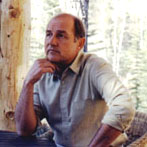
(Click on photo for larger image.) |
PW: So this particular episode was one of the worst for Gerry...
LM: [laughing] But one of the best for me as an actor! I loved it simply because it had a lot of variety. It was a whole spectrum of things he went through, and emotions. And for an actor, that's food. Playing a bad guy, it's great! Ask any actor. They'd much rather play a bad guy. I mean, Gerry's a semi-bad guy, he's not a monster of any kind.
PW: Not like Albert Golo!
LM: [laughing] No, not like Albert Golo!
PW: But you're right--he's not fondly looked on.
LM: But in a way he is. As the years went by, he had a kind of semi-affair with Rosie, so it's starting to kind of...
PW: One of my favorite scenes is in "Borrowed Time," that beautiful scene in the cafe when Rosie and Gerry are looking through the scrapbook.
LM: It's a lovely story with the scrapbook because the art director actually called my mum in Montreal and asked whether she had any pictures of me when I was a child. So that helped. It was quite something.
PW: My sense of the end of that scene, when Gerry kisses Rosie after he's told her the story of his lost love from his youth, where he's forced away from the girl he loves, and he says he's never fallen in love again--until now. And it's been obvious of course, for a couple of seasons. There's that one scene in...whose wedding was it?
LM: Harris's, probably, where he gets drunk and sings this lovely Ukrainian song.
PW: My sense of that scene in Borrowed Time was that he'd accepted that he and Rosie were just going to be friends. Is it your sense that Gerry has let go of the idea of anything further happening with Rosie?
LM: It's a hard one to say. No, I think he still has it as a real [feeling], because otherwise he wouldn't have revealed himself in that fashion. You'd have to feel pretty close to someone before you would.
PW: It seemed like there was some closure on the situation, though.
LM: Yeah, but I think that was because it was supposedly--and in fact turned out to be--the last episode, so there was that aspect of it, too. Whether he was going to move off to Vancouver Island and see her again or not.
PW: But he never left!
LM: [laughing] He never left.
PW: So there's the potential of that storyline opening again.
LM: I guess so. There are so many storylines that weave in and out over the years. Even in each episode there are sometimes strands that kind of are a little loose and nobody knows how to close them off. The great thing about the series is that there are so many characters and that really brings the town to life, but on the other hand it's very hard to fit all the various stories in. It requires almost a mathematician.
PW: Is that what they use you for?
LM: [laughing] No, but they probably should have!
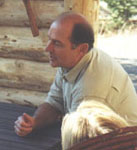
(Click on photo for larger image.) |
PW: One of the major strengths of "North of 60" is that there are so many interesting characters that the nominal lead actors can be away and the show doesn't suffer. For instance, one time Tina Keeper was away for about three consecutive episodes. It's happened with some of the other main characters, too. There aren't many shows that could do that.
LM: I think that, again, is the town. I think what became really great about it is the fact that it became a town, it had a life of its own. So even though Tina might not be in an episode, she's still present. And I think that the way the whole season developed, I don't think that was originally how they intended it. I think originally it was going to be a story about a Mountie and this white woman [Sarah Birkett] up in the north having a relationship in a very unusual place. The first couple of scripts were very much in that direction. But then I think even in the first episode there was a scene where Elsie came through the door and said, "Okay, you can stay." And that scene for some reason I think was so powerful that we realized, "Oh my God, there's a whole life here," and I think that began to take over and became the story.
PW: That's great, because they can do an episode that really focuses on Gerry, or on Harris, or Lois, and the show doesn't suffer. If anything, it gets stronger when they do that.
LM: And that's because of the strength and the presence of the town, of the townspeople. They're always present.
PW: When you did "Borrowed Time," did you know that you might be able to do some movies, or did you think that was going to be it?
LM: It was up in the air. I don't know exactly what the producers knew, but everybody was saying it's probably over, the series, but they might do a movie. That was the thinking at that time. There was still a chance of the series continuing, but I didn't have much confidence personally.
PW: There's a point near the end of that episode where Gerry says that maybe he won't move right now. So even then they were leaving it open.
LM: They were leaving it open. Yeah, and the last shot of the general store where everybody goes in.
PW: I don't think they've really addressed in the first two movies why Gerry is still there. Presumably he's still thinking about what to do.
LM: Yeah, and the movies have changed a little bit. Especially the last two have become kind of mystery stories, so I don't think they're continuing to kind of weave storylines that way. Characters are still present, yes, but it's not the same thing.
PW: So at some point in the future, we might hear more about why Gerry decided to stay?
LM: It's up to the writers! What the writers write...
PW: I think the show's viewers are very happy that Gerry has stayed, because even though he isn't the most popular guy in town, every one of those characters is essential to the show.
LM: Absolutely. Especially someone like Gerry, because he's the foil. It's important to have someone like that. You can't have just a bunch of very nice Native people, because that would be unrealistic. Balance, that's what makes drama work. Conflict.
PW: If we could talk for a few minutes about your theater work...I want to start with a very important question. In "Paper Wheat," you were juggling dinner rolls. Where did you learn how to do that?
LM: At NYU, as a matter of fact.
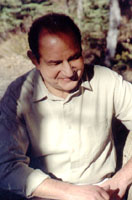
|
PW: It was part of your theater training there?
LM: It was. We had a course called "Circus."
PW [laughing]: It wasn't the Ukrainian Royal Ballet, or whatever you said in the play?
LM [laughing]: No, no. That was a gag!
PW: Who thought up that idea of juggling and eating pieces out of a dinner roll to illustrate the farmer's share of wheat prices? The middleman gets this much, and the government gets this much, and the farmer gets this much...
LM: I did. How it came along is someone had a graph of what happens to a loaf of bread. It was just a graph. So we said, we have to do something about this. So I came up with the idea of juggling two balls and a bun while talking about the facts and figures. I wrote it in 45 minutes and I never changed one word. It was a moment of inspiration. And it was always a showstopper.
PW: From what I've heard, the play went over fantastically.
LM: Actually an amazing, amazing show. We did six different productions of it, and we did a national tour. We played both in the smallest towns you can imagine, and in large cities--Ottawa, Vancouver. It was really remarkable in that everybody loved the show. Altogether we performed it, I reckoned it once, at 14 months, and we missed a standing ovation twice. And it was always a spontaneous one. And when we opened it, I didn't think it was very good!
PW: When was this, the mid-'70s?
LM: 1977 was when we first did it. That was in Saskatoon. We did a mini-tour in Saskatoon. And then Toronto, and then we did it in '78 in Montreal, and...
PW: It starts out with the immigration era, then moves into the Depression.
LM: It's the same thing you were talking about before with Garrison Keillor and his show, because it had the specificity of these immigrant characters that everyone invented. The specificity of Saskatchewan. And that had a real ring to everybody in Canada, whether they came from prairies or knew anything about it. Again, it's the same thing: speak the truth simply and in detail, and you will speak a universal truth.
PW: But a lot of people who did come to it had lived through the Depression, and it sounds like it especially resonated with them.
LM: I would think. I would think especially, yeah.
PW: It sounds like it was a very special thing.
LM: It really was.
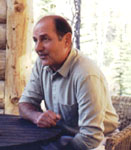
(Click on photo for larger image.) |
PW: You mentioned that you've done some theater recently?
LM: Yeah, I do at least a play a year. The last play was a play written by Alfred Uhry, the person who wrote "Driving Miss Daisy," and it was called "Last Night of Ballyhoo." It actually won a Tony award on Broadway in 1997. It takes place, like all his other plays, in Atlanta, Georgia, so [drawling] I had to do an Atlanta accent and learn all that.
PW: How was that?
LM [drawling]: Ah, it was great.
PW: What was your character?
LM: I played kind of the patriarch of the family. I grew a little gray goatee for the play. It's actually a very interesting play. It's a romantic comedy, and it has the style of '50s romantic comedies, but the irony is really very perfect, because it's about a very upper class Atlanta Jewish family in 1939, and two events are happening: "Gone with the Wind" is opening, and at the same time, Hitler's invading Poland. So the play, again, is a romantic comedy, but the irony implicit in it is amazing. I love the play.
PW: Where did you perform it?
LM: We did it in Winnipeg and Montreal, as a co-production of two theaters.
PW: Where do you live now?
LM: In Toronto. Most of my acting career has actually been in Toronto.
PW: You said you just did an episode of "Nikita"?
LM: Yeah--I played an eastern European terrorist. [laughing] What a stretch--both for the show, and for me! It was fun.
PW [laughing]: Do you have aspirations of being an eastern European terrorist?
LM [laughing]: Not particularly, no. But what I like about "Nikita" is that, like all those spy things, it's always on the edge of parody. They keep it on the serious side, but [the parody] is implicit. That's fun for an actor to play.
PW: What do you have lined up now?
LM: Well, I'm going to do another play soon, and I'm up for two films, so we'll see.
Text and photos (c) 2001 Patricia F. Winter, except as noted.
All rights reserved. For personal use only. Do not distribute to other persons by electronic or non-electronic means (including posting on a web site) without prior permission from the copyright owner.